Items
Search full-text
Creative Writing
-
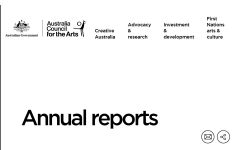 "Australia Council - Annual Report 2015-16" Australia Council - Annual Report 2015-16 - discusses year in review, strategy, funding, and key facts, including "18% identified as Aboriginal or Torres Strait Islander 6% identified as experiencing disability", and running Sync Leadership Program for artists with disability
"Australia Council - Annual Report 2015-16" Australia Council - Annual Report 2015-16 - discusses year in review, strategy, funding, and key facts, including "18% identified as Aboriginal or Torres Strait Islander 6% identified as experiencing disability", and running Sync Leadership Program for artists with disability -
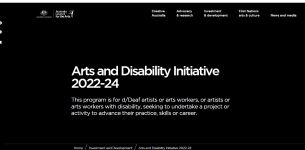 "Australia Council Arts and Disability Initiative 2022-24" Australia Council Arts and Disability Initiative 2022-24 - reads, in part "This program is for d/Deaf artists or arts workers, or artists or arts workers with disability, seeking to undertake a project or activity to advance their practice, skills or career."
"Australia Council Arts and Disability Initiative 2022-24" Australia Council Arts and Disability Initiative 2022-24 - reads, in part "This program is for d/Deaf artists or arts workers, or artists or arts workers with disability, seeking to undertake a project or activity to advance their practice, skills or career." -
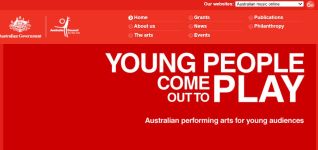 “Australia Council for the Arts website captured 2008” The website reads “The Australia Council for the Arts is the Australian Government's arts funding and advisory body.” – links to the arts, Grants, News, Events, Publications, Philanthropy.
“Australia Council for the Arts website captured 2008” The website reads “The Australia Council for the Arts is the Australian Government's arts funding and advisory body.” – links to the arts, Grants, News, Events, Publications, Philanthropy. -
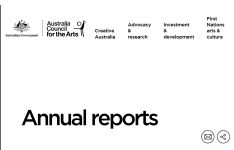 "Australia Council - Annual Report 2019-20" Australia Council - Annual Report 2019-20
"Australia Council - Annual Report 2019-20" Australia Council - Annual Report 2019-20 -
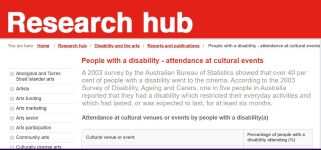 “Australia Council - People with a disability - attendance at cultural events 2008" Australia Council - People with a disability - attendance at cultural events 2008 - reads, in part "A 2003 survey by the Australian Bureau of Statistics showed that over 40 per cent of people with a disability went to the cinema. According to the 2003 Survey of Disability, Ageing and Carers, one in five people in Australia reported that they had a disability which restricted their everyday activities and which had lasted, or was expected to last, for at least six months."
“Australia Council - People with a disability - attendance at cultural events 2008" Australia Council - People with a disability - attendance at cultural events 2008 - reads, in part "A 2003 survey by the Australian Bureau of Statistics showed that over 40 per cent of people with a disability went to the cinema. According to the 2003 Survey of Disability, Ageing and Carers, one in five people in Australia reported that they had a disability which restricted their everyday activities and which had lasted, or was expected to last, for at least six months." -
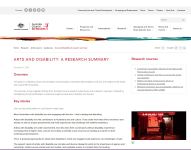 "Arts and Disability: A research summary" Australia Council - Arts and Disability: A research summary, 2018 - reads, in part "The great art created by artists with disability, and participation of people with disability in the arts, are integral to the artistic and cultural life of Australia. This summary brings together findings from Australia Council research publications and a research overview compiled by the Meeting of Cultural Ministers to build the evidence base about disability and the arts."
"Arts and Disability: A research summary" Australia Council - Arts and Disability: A research summary, 2018 - reads, in part "The great art created by artists with disability, and participation of people with disability in the arts, are integral to the artistic and cultural life of Australia. This summary brings together findings from Australia Council research publications and a research overview compiled by the Meeting of Cultural Ministers to build the evidence base about disability and the arts." -
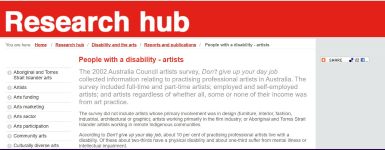 “Australia Council - People with a disability - artists 2003” Sourced from 'Australia Council- Don’t give up your day job: An Economic Study of Professional Artists in Australia' (Throsby and Hollister 2003) based on 2002 Survey - The website reads “The 2002 Australia Council artists survey, Don't give up your day job collected information relating to practising professional artists in Australia…..According to Don't give up your day job, about 10 per cent of practising professional artists live with a disability.”
“Australia Council - People with a disability - artists 2003” Sourced from 'Australia Council- Don’t give up your day job: An Economic Study of Professional Artists in Australia' (Throsby and Hollister 2003) based on 2002 Survey - The website reads “The 2002 Australia Council artists survey, Don't give up your day job collected information relating to practising professional artists in Australia…..According to Don't give up your day job, about 10 per cent of practising professional artists live with a disability.” -
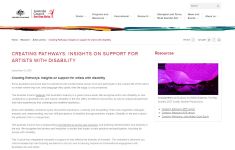 "Australia Council - Creating Pathways: Insights on support for artists with disability - 2018" Reads, in part "This report brings together findings and insights from a range of research undertaken in 2017–18 to inform the Council’s approach to future support for artists with disability."
"Australia Council - Creating Pathways: Insights on support for artists with disability - 2018" Reads, in part "This report brings together findings and insights from a range of research undertaken in 2017–18 to inform the Council’s approach to future support for artists with disability." -
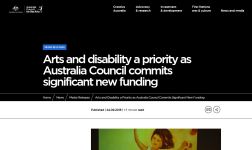 "Australia Council - Arts and disability a priority as Australia Council commits significant new funding" Australia Council - Arts and disability a priority as Australia Council commits significant new funding - reads, in part "The Australia Council has committed $750k over three years to support sustainable careers and to recognise the artistic excellence of artists with disability."
"Australia Council - Arts and disability a priority as Australia Council commits significant new funding" Australia Council - Arts and disability a priority as Australia Council commits significant new funding - reads, in part "The Australia Council has committed $750k over three years to support sustainable careers and to recognise the artistic excellence of artists with disability." -
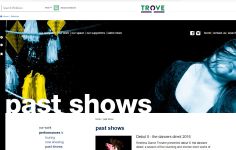 "Restless Dance - Past Shows 2012 - 2016" Restless Dance Website, information about past shows 2012-2016, captured 2020 – information about Debut 5: the dancers direct (five short works from Youth/Senior ensembles), In The Balance (at Adelaide Cabaret Festival) Touched (directed by Michelle Ryan with Youth ensemble), What’s a Nice Girl Like You Doing in a Place Like This? (directed by Emma Stokes with the Senior ensemble), Naturally (directed by Michelle Ryan with Youth ensemble), Salt (touring work developed by Rob Tannion), Debut 4 – the dancers direct 2013 (short works by five company members), high voltage 2012 (short work directed by Lorcan Hopper, as part of Debut 3 – the dancers direct and toured to Port Moresby) and Howling Like A Wolf (creative via collaborations between Restless and Melbourne based Rawcus Theatre led by Kate Sulan).
"Restless Dance - Past Shows 2012 - 2016" Restless Dance Website, information about past shows 2012-2016, captured 2020 – information about Debut 5: the dancers direct (five short works from Youth/Senior ensembles), In The Balance (at Adelaide Cabaret Festival) Touched (directed by Michelle Ryan with Youth ensemble), What’s a Nice Girl Like You Doing in a Place Like This? (directed by Emma Stokes with the Senior ensemble), Naturally (directed by Michelle Ryan with Youth ensemble), Salt (touring work developed by Rob Tannion), Debut 4 – the dancers direct 2013 (short works by five company members), high voltage 2012 (short work directed by Lorcan Hopper, as part of Debut 3 – the dancers direct and toured to Port Moresby) and Howling Like A Wolf (creative via collaborations between Restless and Melbourne based Rawcus Theatre led by Kate Sulan). -
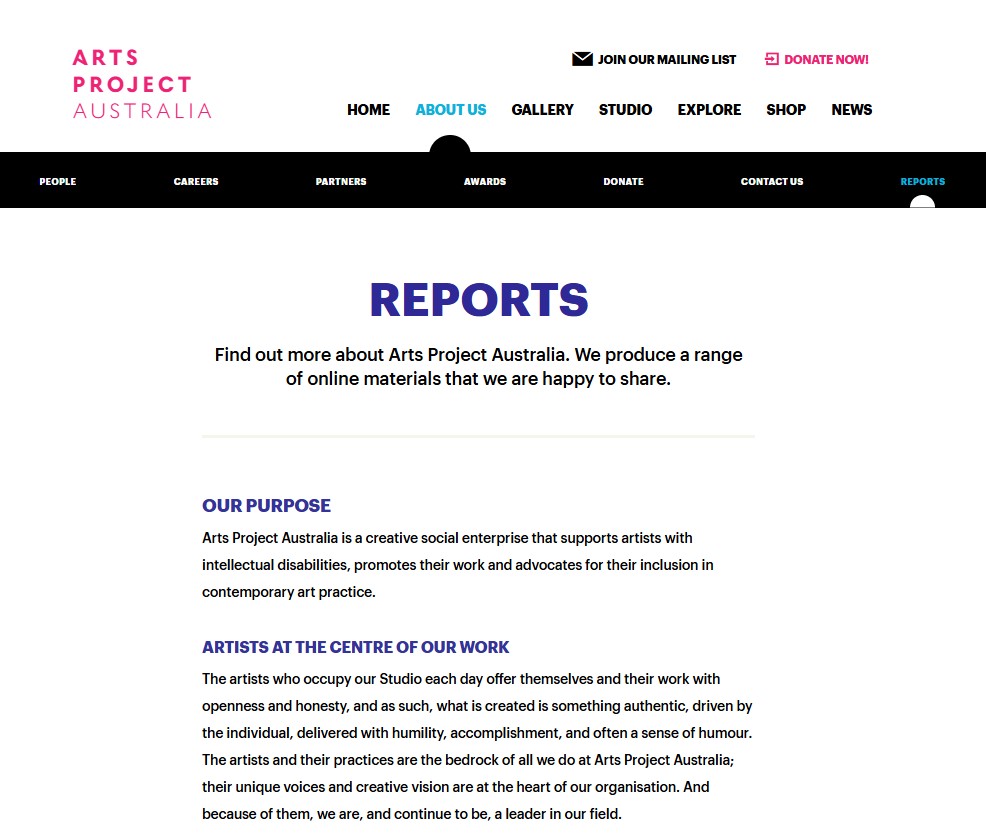 "Arts Project Australia - Annual Reports 2016-2021, captured 2022" Arts Project Australia - Annual Reports 2016-2021 - reads, in part "Arts Project Australia is a creative social enterprise that supports artists with intellectual disabilities, promotes their work and advocates for their inclusion in contemporary art practice."
"Arts Project Australia - Annual Reports 2016-2021, captured 2022" Arts Project Australia - Annual Reports 2016-2021 - reads, in part "Arts Project Australia is a creative social enterprise that supports artists with intellectual disabilities, promotes their work and advocates for their inclusion in contemporary art practice." -
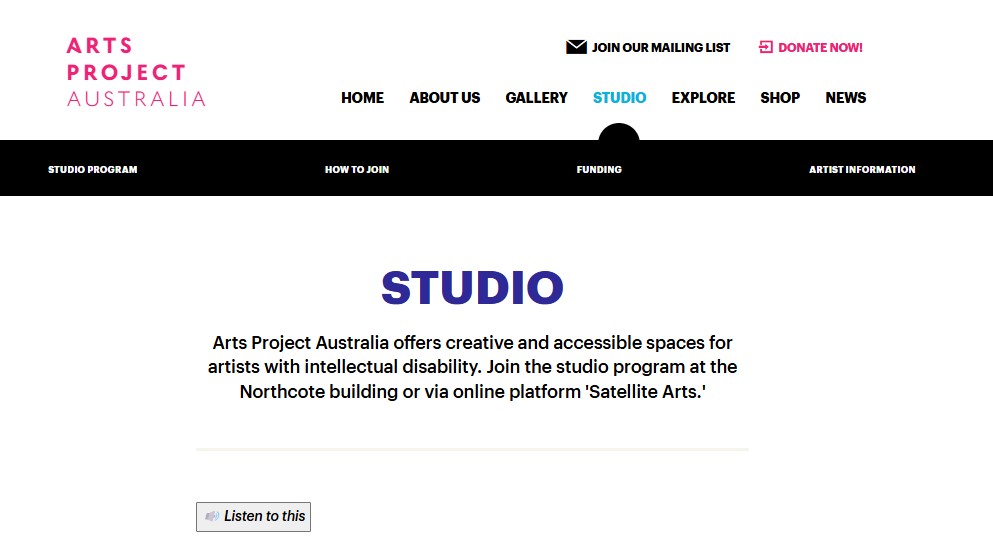 "Arts Project Australia - Studio, captured 2022" Arts Project Australia - Studio - reads, in part "Arts Project Australia offers creative and accessible spaces for artists with intellectual disability. Join the studio program at the Northcote building or via online platform 'Satellite Arts.'"
"Arts Project Australia - Studio, captured 2022" Arts Project Australia - Studio - reads, in part "Arts Project Australia offers creative and accessible spaces for artists with intellectual disability. Join the studio program at the Northcote building or via online platform 'Satellite Arts.'" -
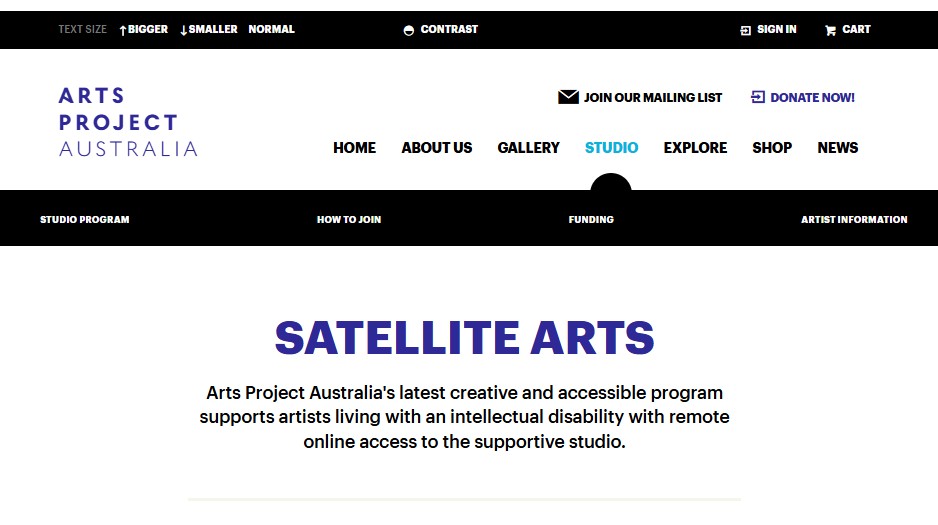 "Arts Project Australia - Satellite Arts, captured 2022" Arts Project Australia - Satellite Arts - reads, in part "Arts Project Australia's latest creative and accessible program supports artists living with an intellectual disability with remote online access to the supportive studio."
"Arts Project Australia - Satellite Arts, captured 2022" Arts Project Australia - Satellite Arts - reads, in part "Arts Project Australia's latest creative and accessible program supports artists living with an intellectual disability with remote online access to the supportive studio." -
"Australia Council commissions a research study on people with disabilities' participation in arts activities" Australia Council commissioned a research study on the problems faced by people with disabilities attempting to participate in art activities (Australia Council Annual reports 1979/1980 and 1980/1981).
-
"Making the arts work for everyone: a resource and information kit about arts and disabilities produced in 1995" Arts Access Victoria and Australia Council published 'Making the Arts Work for Everyone: A Resource and Information Kit about Arts and Disabilities' in 1995.
-
"The Australian Elizabethan Theatre Trust begins operations in 1954" The Australian Elizabethan Theatre Trust began operations in 1954. The key role of the trust was to support the arts in Australia leading to the independent companies of: Opera Australia, The Australian Ballet Foundation, National Institute of Dramatic Art (NIDA), and Bell Shakespeare Company. At this time there was little involvement of people with disabilities in the arts.
-
“Assistance to Composers Advisory Board created by the Commonwealth government.” In 1967, the Commonwealth government created the Assistance to Composers Advisory Board with an aim to advise on funding needs for music composition and promotion of Australian composers. The Board was to judge work based on “musical distinction or excellence of its kind, and on the promotion of Australian composers both in Australia and abroad”. The Board’s functions were later absorbed by the Australia Council.
-
"The Australia Council establishes the Community Arts Committee in 1973 and the Community Arts Board in 1978" The Australia Council established the Community Arts Committee in 1973 and the Community Arts Board in 1978. The purpose of the latter was to encourage wider participation in the arts, especially for groups with little social capital. The Board was “the first funding body to identify the community arts phenomenon and respond with definition and policy." This occurred under the directorship of Rosalie Bower, the first director of the Community Arts Board, who wrote in a paper entitled 'The Case for a Community Arts Centre': “The activities within a centre should be accessible to children, aged people, the physically handicapped, ethnic groups and those whose time is severely restricted by work and family ties. The activities supplied by the centre should be conducted free from competitive elements which otherwise might discourage people from participation, and they must be inexpensive and accessible at almost any time. They must not pre-suppose education or income levels which would cut them off from any section of the community.'" (Australia Council 1979/1980 Annual Report, page 32)
-
“Australia Council grants funding for projects about disability or for disabled participants throughout the 1970s” The 1974/75 Australia Council annual report states $1,350 in funding granted to Spectrum Films (NSW) to "develop a screenplay for a feature film of the social pressures on a deaf mute”, as well as a $4,500 travel/study grant to Lloyd Nickson (QLD) "to attend summer schools in children's theatre and theatre for deaf children (USA and UK) for six months". In the same year, the Council reported Bryan Gracey as one of numerous individuals in receipt of Experimental Film funding for his short film ‘The World of a Blind Child’ (1975) about the emotional and physical difficulties 10-year-old Peter faces and how he navigates his disability. In the 1974/75 financial year, Australia Council’s crafts board awarded $1,288 to the Wheelchair and Disabled Association (NSW) for "Jewellery making tools and equipment". The 1979/1980 Australia Council annual report describes the following funding: "As in previous years, a grant was given to the Braille and Talking Book Library for its Braille Book of the Year.”
-
“Australia Council praises NSW Theatre of the Deaf and provides some funding to the Deaf theatres throughout the 1970s” The 1976/77 Australia Council annual report stated: "The NSW Theatre of the Deaf is a significant achievement. The only funded organisation in Australia working in nonverbal theatre, its production of King Lear received widespread praise. This company is now accepted as operating in a legitimate area of theatre rather than performing mime works for the deaf. This offers wide scope for innovation." The Council’s 1977/78 annual report recorded that it granted funding to the NSW Theatre of the Deaf “towards salaries of artistic director, deaf director, and tutors’ fees in 1978” for $25,000; the “presentation of theatre pieces (mime, clowning, puppetry) in public performance” for $2,500, and “towards costs of a production in 1978” for $4,000. It also awarded $1,980 to Queensland Theatre of the Deaf “towards the cost of transporting company to Sydney for seminar with NSW Theatre of the Deaf”. Drama Resource Centre (Victoria) received $2,840 “to develop student theatre at Victoria School for Deaf Children” and $630 went to Children’s Activities Time Society (Western Australia) for the “cost of deaf mime artist, Rae Gibson, to undertake four week visit to Melbourne and Sydney to work with deaf artists”. The following annual report for 1978/79 recorded that the Council granted $25,000 to the NSW Theatre of the Deaf “towards salaries of artistic director, administrator and tutors” in 1979. The Council also awarded $1,800 to the Queensland Theatre of the Deaf towards a salary for Geoffrey Rush to work with the company in 1979. The 1979/1980 Australia Council annual report mentions funding “provided for a playwright-in-residence at the NSW Theatre of the Deaf.”
-
“Salubrious Productions (QLD) established in 1999” Salubrious Productions (Queensland) was established in 1999. Salubrious is an agency for disabled artists, representing musicians, writers and composers, theatre performers and actors, visual artists, and technicians in the creative industries. The agency continues operation today. Their website describes them as follows: “Salubrious Productions is a Brisbane-based entertainment and production agency. We represent a core of more than 200 diverse acts and artists and draw further from a large network of professional artists throughout Queensland and Australia.”
-
“Australia Council releases its first Disability Action Plan” In 1996, the Australia Council for the Arts released its first Disability Action Plan.
-
“National Arts and Disability Strategy is launched in 2009” In 2009, the National Arts and Disability Strategy was agreed on by Australian Cultural Minister’s Council. The strategy sought to improve access and participation in the arts and identified four priority areas: barriers to access and participation, supporting the creative practice of artists with disability, developing audiences for disability arts practice, and strengthening policy and planning within governments.
-
“The National Disability Insurance Scheme (NDIS) is launched” Following the spike in interest in the mid to late 2000s, significant steps were made towards the development of the National Disability Insurance Scheme (NDIS). It came about as the result of discussions about alternatives of disability support arrangements from 2007 to 2011. This included National Disability Strategy 2010–2020. A trial phrase of the NDIS was launched in 2013, and the scheme was rolled out across the country from July 2016. The 2022 change of government, which saw the Labor party voted in for the first time in nine years, reflected voter concern for climate change and social policies. The new prime minister Anthony Albanese ordered an independent review of the NDIS. The NDIS Review report was published in 2023 and had a number of recommendations, including affording funding based on functional impairment rather than diagnosis, increasing support for children, a requirement that all providers be registered, and state governments providing supports through other services for people who do not meet NDIS criteria.
-
“The Australian Government launches a new national cultural policy, Revive: a place for every story, a story for every place” The Australian Government launched a new national cultural policy, Revive: a place for every story, a story for every place. Revive comprises 5 pillars: First Nations First, A Place for Every Story, Centrality of the Artist, Strong Cultural Infrastructure, and Engaging the Audience. The policy allocates $5 million for an Arts and Disability Associated Plan, under Australia’s Disability Strategy 2021–31 “to enable people with disability to access and participate fully in the cultural and creative life of Australia.” This replaces the National Arts and Disability Strategy.
